Tribeca Film Festival Day 3 Round-Up
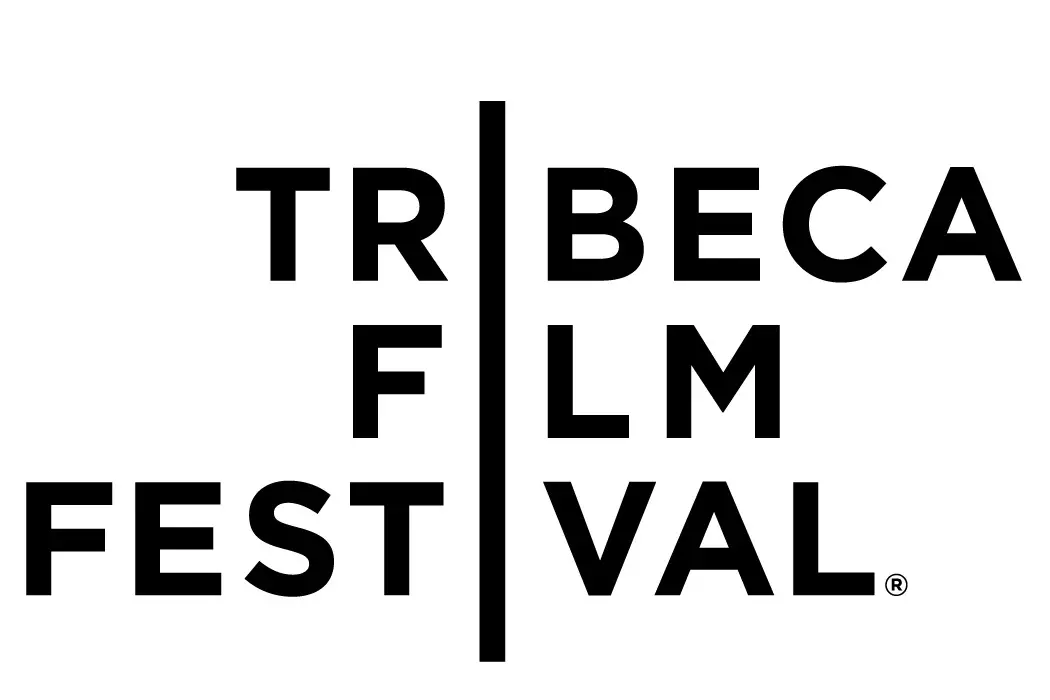
Stephanie Archer is 39 year old film fanatic living in…
With the start of Day 3, I was super excited for the opportunity to change things up. Up until this point, the majority of my screenings had been narratives and documentaries. Today, I had tried to pack my day full of short films – both animated and live-action. The Tribeca Film Festival was offering different sets of selected short films throughout the festival and I had scheduled two of these sets for viewing – Animated Shorts Curated by Whoopi Goldberg and Last Exit.
Short films, in my opinion, are one of the most underrated forms of media – mostly due to the lack of distribution and the ability of patrons to view them. I, myself, find it difficult to see more than two of these a year (mostly just Pixar shorts) – if any. I am always amazed at how much emotion a short film can elicit in such a short amount of time.
Animated Shorts Curated By Whoopi Goldberg
The animated shorts were definitely one of the screenings I was most excited to see – I mean, who doesn’t like cartoons. Each had its own special element that was brought to screen, whether it was through tearjerking themes, transitions from childish ways, making difficult discussions or competing against forces we can only control so far, these films were everything I had hoped for and more.
Curpidgeon
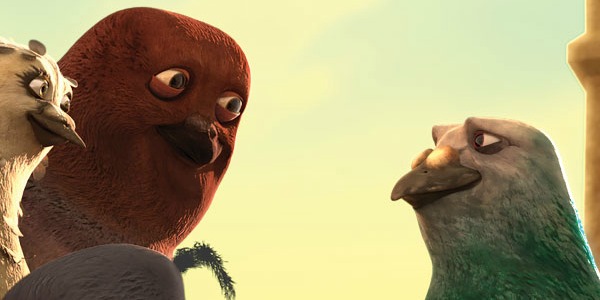
Curpigeon by Dmitry Milkin was the cutest, yet saddest animated short the morning had to offer. Opening with a group of chirpy, excited birds watching the hands of a clock tick down, one bird cynically picks on them for there anticipation for what is to come. With the chiming of the hour, elderly men of all shapes, physicality and sizes make their way to their respective benches, joyously flinging bird seed into the air. Each bird happily flies to their counterpart indulging in the abundance freely offered – except for one.
Hiding a small piece of paper under his wing, this pigeon looks longingly at an empty bench where his human once sat. Unable to find comfort in the others, the little pigeon flies to the local cemetery, leaving the piece of paper (a photograph of the man’s long since deceased wife) at the base of one of the gravestones – the headstone of his human whose photo the bird had been unable to return in life. Standing sullen before the headstone, the bird is joined by the group from the park, reassuring him that he is not alone in his time of need and his time of grief.
Curpigeon was one of the short films that had me tearing up that morning, the sincere story of a bird grieving and regrettably unable to return a prized item to his human was heartbreaking. Yet, as sad as it was, it was reassuring how clear the film’s message was – you are never alone.
Summer Camp Island
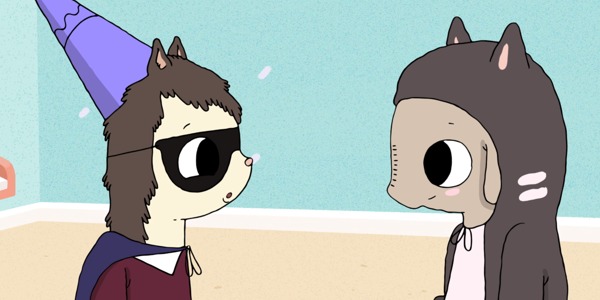
Summer Camp Island by Julia Pott is a coming of age short film that follows camper Oscar and his summer at a magical camp where everything comes to life. Homesick, Oscar plans the ultimate, most normal sleepover party with his long time friend Hedgehog. His excitement and anticipation for the night is quickly marred when Oscar finds out Hedgehog has invited her crush to join in the night of normalcy. Determined to still achieve everything on their sleepover activity checklist, Oscar tries to include the unwelcome guest on his terms, finding that his night of normalcy is not for everyone.
Summer Camp Island is a coming of age story about the transition from childhood into teenage years. Oscar is faced with growing up and facing his fears about the things around him that he does not know or understand – the magical creatures, love, friends. This was an adorable tale that many children will be drawn to and parents will approve of.
And I am not the only one to think so! Recently, this short film was picked up by The Cartoon Network to be adapted into a children’s television series (as reported by deadline.com). With the success of the animated short, this series is sure to a household favorite.
Odd is an Egg
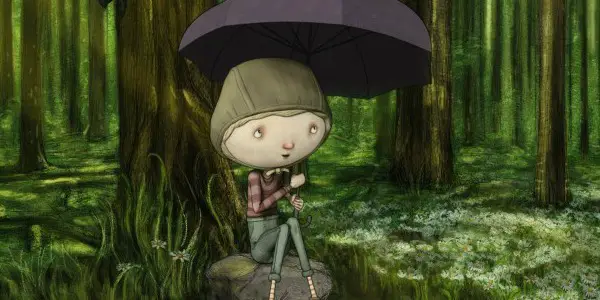
Odd Is An Egg (Odd Er Et Egg) is a Norwegian animated short film by Kristin Ulseth, based upon the illustrated book by Norwegian author and illustrator Lisa Aisato. Odd Is An Egg begins with a young egg headed boy (literally) struggling with the anxiety of his frail body type. Risk of cracking his head is everywhere: when he leaves the house, in the playground, at school. Even his dreams provide him no relief. His fears control every aspect of his life – that is until he meets Gunn.
Gunn, thinking she is a bumblebee, has no fear and embraces everything in life. She reaches out to Odd to show him all the fun he could be having. When Gunn fails to meet him one day for their playdate, he searches high and low for her in the boiling heat. Finally finding her at home (she has been grounded), he climbs a series of flower boxes to gift her with honey. Yet, a misstep sends him hurtling to the ground…
Winner of the 2017 Tribeca Film Festival Best Animated Short, it is clear to see why Odd Is An Egg is so loved. With its stunning visuals and catchy tunes, the film effectively shows how fear will hold us back. Yet, by embracing what we fear, we may find ourselves overcoming it. When all is said and done, we may find ourselves more durable and more wholesome than we ever thought we could be.
Angel
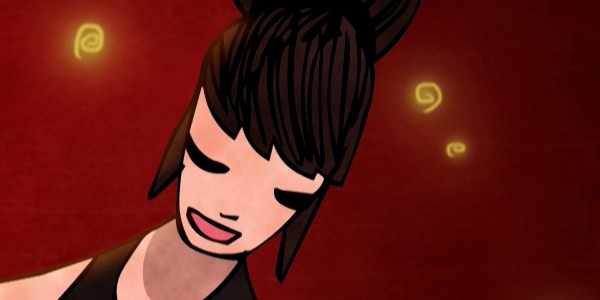
Angel (Mon Ange) by Gregory Casares is a Swiss short film about two lovers who have a forbidden love. The love of Eva and Mr. Corbeau is apparent from the opening of the film, the two lovers dancing freely throughout the forest and with each other. Yet, Eva’s father appears, condemning what he sees, shooing away the bird and dragging Eva back to her castle.
As the sun sets, a masquerade party begins, thrown by the father of Eva in her honor. Suitors from near and far have arrived in hopes of making a lasting impression and winning her hand in marriage. The bird, easily blending in amongst the masked guests, finds Eva, and the two continue their dance from the woods for all to see. Infuriated, the suitors attack the bird, chasing him into the woods, their anger transforming them into vicious animals. Eva runs after them, yet finds herself cornered by the animalistic band of suitors. A battle ensues when Mr. Corbeau arrives to protect his love.
Angel to me was a weird film, and my least favorite of the day. The beginning of Angel had me thinking of Edgar Allen Poe; maybe it was the raven-esque bird or the dark drawings that were reminiscent of the art paired with Poe in my English school books from when I was a child. There was nothing that really made is stand out. The theme, that love transcends all, was clear and concise, yet I wasn’t really sure how I felt after watching it. I think I was looking for more in such an overdone concept of film, but wasn’t left with anything new to hold on to.
The Talk: True Stories about the Birds and the Bees
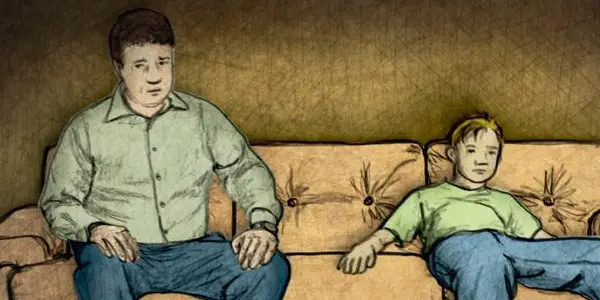
The Talk: True Stories About The Birds and The Bees is a short film by Alain Delannoy and is comprised of a series of (at most times) faceless drawings retelling the time that their parents, or father, gave them the talk. It is an awkward collection of stories varying from highly christian to TMI (Too Much Information).
Each story was unique, yet every person watching this short film can find some relatability with at least one, or part, of the stories these gentlemen share. Throughout most of the film, viewers will here these stories, as well as the reactions experienced by the children receiving them. Yet, what truly makes this film authentic is the role reversal these gentlemen transition to in the end. Each, like a child, states that they will not do the same as their parents. They will not make it awkward, gross or permanently damaging – they will learn from the mistakes of their parents.
Yet, in almost the same breath, there is a fear expressed and an acknowledgement about how awkward it will be to give the talk. By not just focusing on the children who received the talk, but also on the parents, and future parents, that must give it, the entire film comes full circle, acknowledging both sides of the awkward coin.
Second to None
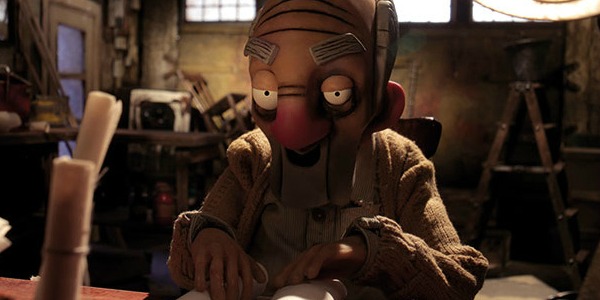
Second to None is a hilariously clever stop motion short film by Vincent Gallagher about the second oldest man in the world who hatches a series of plans to off the current record holder for oldest man in the world – subsequently achieving the title for himself. The kicker is that Frederick Butterfield is on a mission to dethrone the man who has always beaten him at everything – his twin brother Herman.
Yet, achieving the coveted number one position does not go off as planned, as each of Frederick’s carefully constructed and at times mechanically engineered plans each end with unexpected consequences. With each failed attempt, Frederick learns that sometimes the best way, is the simplest.
This was an awesome short film. The script and direction by Vincent Gallagher were all on point, effectively delivering an outstanding stop motion film. The characters within the film were beautifully crafted and genuinely authentic looking. This short film sizes itself up to be as well made as full length feature films that have come before it: Chicken Run, Wallace and Gromit and The Nightmare Before Christmas.
Escape

While Escape was only five minutes long, it was captivating and mesmerizing. The animation was epic; the music only magnetizing how epic it really was. When the five minutes were up, I was hoping that this very short film was the beginning of something greater. Escape is a short film by Limbert Fabian and Brandon Oldenburg about a girl deserted on a hostile planet who must create a habitable world.
Failing her initial attempt, the young girl ventures back into the unknown in search of the right elements required for her task. In the moment of discovery, however, her success is met with challenge as a creature of epic proportions threatens everything she is about to achieve. Her will and determination overcome adversity – even if it might require the ultimate sacrifice.
Escape is an animated representation of all the researchers, explorers, engineers and inventors who were unafraid to try to make the world a better place – never giving up even in the face of hardships and failures. Like the young girl, they too had to face and overcome various adversities – each leaving a permanent mark on the world.
Dear Basketball
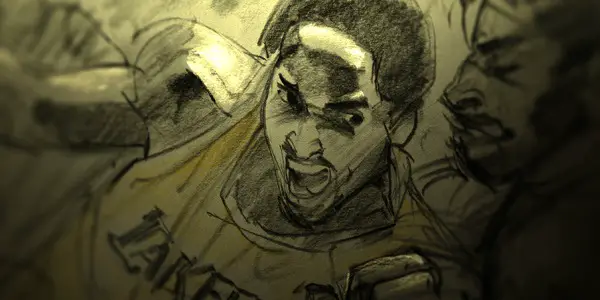
Dear Basketball was one of my favorite short films of the day, one I have not stopped thinking since its screening. Dear Basketball is a moving letter brought to life through animation and narration of an adult saying goodbye to his best and long time friend – Basketball. Written by Kobe Bryant (originally as a poem) and brought to life through animated sketches by Disney animator and director Glen Keane, this short film will call to the inner child within all of us.
Dear Basketball begins with a young child who has recently fallen in love with the sport, rolling up his socks into a tight ball and shooting them from his bed into his homemade basketball hoop. The film continues, quickly watching the boy grow up, taking his love for the sport all the way to the top, becoming a member of the Los Angeles Lakers. Yet, as the now grown boy explains to his beloved, it is time to stop. While his mind is able and willing, his body has reached its limits. He thanks Basketball and reassures it that he will never forget what the sport has done for him and the achievements they have made together.
If there is one short film you see this year, make it this one. I found myself tearing at the wholehearted farewell and the understanding that all great things must end. I am not a fan of basketball, yet have my own love and passions for other things in life. No matter what you find passion in, you as a viewer can imagine yourself trying to find the ability to say goodbye and adapt to the new roles around you.
Last Exit Short Films
Following the animated shorts, I made my way to the next screening – a variety of live-action shorts called Last Exit. Many of these films would deal the theme of breaking from oppression, while other were just a hilarious and ridiculous ride through various cultures.
Oh, Damn
Oh, Damn is a short film by Pat Bishop and Matt Ingebretson about the pot induced adventures of a guy (Matt Ingebretson) at the movie theater. This was just a ridiculous, yet epically hilarious short film. A man, agreeing to meet someone at the theater, delays his trip to smoke an extra large blunt.
Arriving at the theatre late, his high begins to become overwhelmingly difficult to handle. Watching the advertisement for concessions on the screen, bags of popcorn and twizzlers sing about the death and pain they wish you would purchase them for. Horrified, the young man watches as his friend (Barbara Grey) aggressively bites into a twizzler, ripping a piece free.
While he begins to come to, popcorn coming fully into focus, he is shocked to find he is no longer in the theater, but standing in front of the concession counter with a popcorn and a soda. The cashier tells him he still has to pay for it, joking after the money is obtained that this is the fifth time that he has gotten this customer to pay. Confused, the young man makes his way back to the theater spilling everything on himself as he races for the exit when a gun shot from the movie is heard. After meeting a strange man (Fred Willard) in the alley, he makes his way to the entrance but is denied access by the man in the ticket booth – the same cashier from the concession stand – who concurs that everyone knows he’s high and that he needs a ticket.
This was a crazy film, yet somewhat relatable. There is humor in the relatability, and this concept works well for a short film. It was a ridiculous film, yet enjoyable all the same.
Don’t Mess with Julie Whitfield
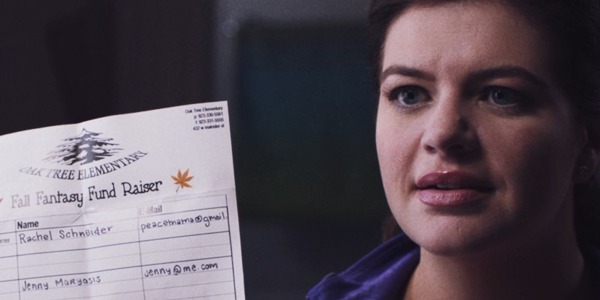
Don’t Mess with Julie Whitfield is a comedic short film by Amy Barham that shows the length housewives will go to in order to secure their positions within various school functions. Julie (Casey Wilson) is always the head of the planning committee for the Fall Fantasy Fund Raiser – always. Over the years, other mothers have tried to come between her and the position, yet all have failed. This year, when new mom Rachel (Mary Elizabeth Ellis) threatens to swoop in and claim the title, Julie is determined to keep her prized leadership role at all costs.
Kidnapping Rachel, Julie strong-arms her, trying to convince her it would be in her best interest to take her name off the sign up sheet. Rachel refuses, breaking free of her jump rope restraints and lunging for Julie. They both break out into a full out brawl, anything in the house a formidable weapon – pans, bottles of cleaner, vases. Yet, as the women are faced with visible cuts and up-coming social preparations, they both realize fighting will get them nowhere and their desires are stemming from the same place. While it all seems like the fund raiser crisis of 2017 has been diverted, one woman finds a way to ensue she will never be challenged again.
This was honestly a hilarious short film, and it was a real pleasure to see the waitress from It’s Always Sunny In Philadelphia branch out of television. The living for the children, bored housewife is a common theme where I live, which only added to the humor of the film – I could really see two house wives duking it out over a school event.
Cul-De-Sac
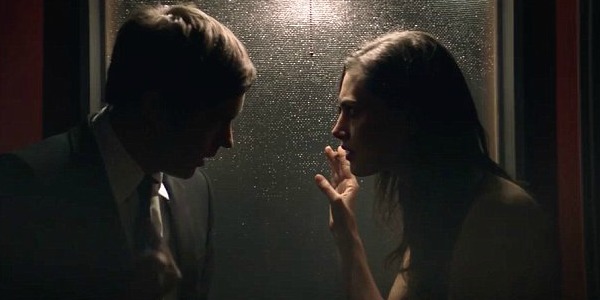
Cul -De-Sac by Damon Russell was the biggest disappointment of the entire collection of short films I saw today – not because it was bad, but because it was SO GOOD. I didn’t want the story to end. This was the only short film I felt had enough strength at its core that it could have spawned an enticing and captivating full-length feature.
While playing with his young son, a father (Shawn Christensen) finds a small listening device within his son’s ratty old Teddy Bear. Clearly alarmed, he carries on as normal as possible, communicating with his wife (Phoebe Tonkin) through the use of sign language. They both pretend nothing has changed, continuing with their planned social engagements for the evening.
After arriving at a party, it is quickly revealed that they are no ordinary couple, and that someone within the room is behind the placement of the device – and may have more malicious intentions in mind. Together, they plan to immediately leave, stopping home to grab their son and make a run for it – before it is too late. With their home to be found further compromised than believed, they realize that time may not be on their side.
I was so disappointed as the film ended and the credits started to role. I wanted to know so badly what happened and where this story was taking these characters. I also had such a strong desire to know what was their back story – how did they get into this position? There were so many questions I had that would be forever be left unanswered.
Retouch
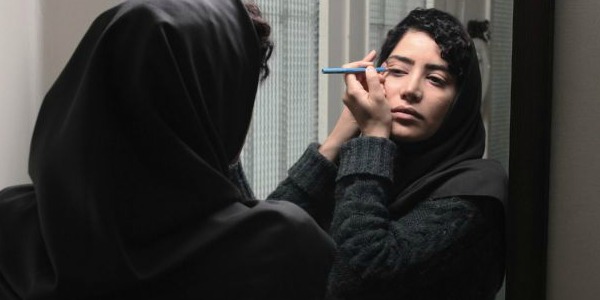
Retouch is an Iranian short film by Kaveh Mazaheri that witnesses a woman allowing the death of her husband following an accident. It takes a cold hard look at the lives of individuals living in the Middle East and the means that are necessary to find an ounce of freedom.
Maryam (Sonia Sanjari) is a strong, soft spoken woman. While caring for her child before daycare and work, noises from the bedroom draw her close to see what her husband Siyavash (Mohammad Hossein Ziksari) is doing. Siyavash is relocating his bench press to their already cramped bedroom as he is determined to work out inside today. While putting on the final touches of makeup, Maryam hears her husband call out to her in panic. He has loaded too much weight, and is unable to bench press the pressure and the weight off his neck. While initially using all her might to save him, Maryam stops, slowly backing away from her husband. He calls to her begging for help, but she just watches as he takes his final breaths.
Finally assured of his death, she drops her child off, Maryam heads to work like normal – where she spends the day taking further orders from men on how images of US celebrities should be censored. She begins placing calls to her husband in order to begin setting the stage for her alibi. Becoming worried as he has not answered her calls or made it to work, she begins calling friends in search for him to no avail…
Breaking free of an oppressive marriage and driven by an oppressive culture, this film shows what individuals are willing to do to be free. While Maryam did not create the incident that would kill her husband, she seized the opportunity when it was presented to her, making sure to cover her tracks along the way. My only complaint with this short film was that the pace dragged slightly, yet the themes and speculation that were raised left much to be discussed. With this small flaw aside, it is clear to see why this film was the winner for the 2017 Tribeca Film Festival Best Narrative Short.
Buckets
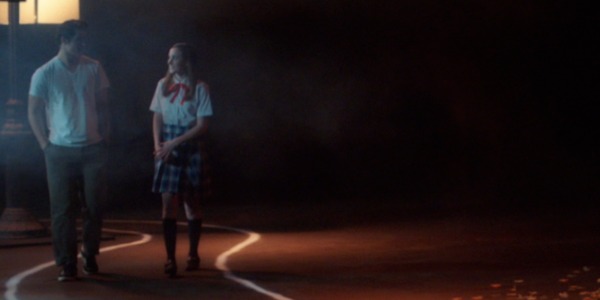
Buckets is a short film by Julia Jones that examines the violent and sometimes heartbreaking sacrifices a woman is willing to make to satisfy her love. Beginning with a young couple, returning home from their first date, the young girl (Olivia Nikkanen) is nervous and excited for how it will end. As they are saying goodnight, the young guy (Wolfgang Novogratz) asks if she will tie his shoes for him. Finding the request strange, the girl does as she is asked.
The love story is quickly whisked forward, finding the two lovers in a car. The young boy is requesting that she give him some money, to which she asks, where did the money she gave him yesterday go? He flashes his smile, states the nature of their current relationship and asks again. The girl, while reluctant, gives all that she has.
Fast forward through time, with only the young guy aging, the girl finds the middle guy (Martin Harvey) in trouble, owing a great deal of money to the gentlemen around him. While he does not have the money to pay, he asks the girl to offer herself in place of him. Hurt at the request, she steps forward offering herself in his place. She is beaten and thrown through a near by window, into the home she shares with the middle guy – who yells at her to stop getting blood on the carpet.
Buckets is the second film that takes a moment to examine the oppression and the sacrifices of woman through the various expectations of men – especially those who mean the most. Buckets also takes a moment to view the lengths a woman is capable of reaching in order to fulfill these expectations. While the examples within the film are at times extreme, their representations are accurate. In the end of the film, the girl is brought back to the moment of the first date where she agrees to tie the shoe laces. However, given the second chance, the young girl opts out of the task, choosing a different life and different expectation for herself.
Baraka
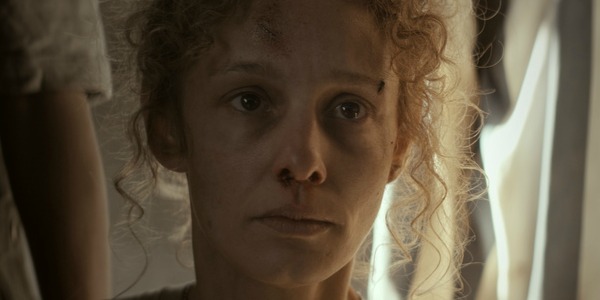
Baraka is a short film from Néstor Ruiz Medina that takes a moment to examine the brutality of war and the change it can bring on a family. Opening with two brothers playing soccer, Baraka quickly takes a darker turn as the eldest relays to his brother (Son Khoury) he is off to war to become a soldier.
Months later, the younger brother and his friend (Taha El Mahroug) find a safe haven to shoot guns and look at porn – stumbling upon an abandoned home and a hostage of war hidden inside. The woman (Esther Acebo) is hurt and begging for water. While the younger brother seems inclined to help her, his friend claims she is one of the reasons they are at war, beating and peeing on the woman. The younger brother pulls a gun on his friend, ending the abuse and indicating his willingness to help her. But unexpected company cuts the aid short.
The boys run and hide as masked soldiers run up to retrieve the woman; as they tell her, it is time to recite her final message. Trying to slip away before they are discovered, the boys disclose their whereabouts running for cover. The younger brother manages to get away, while the friend is not so lucky. He is forced to witness the brutality that is about to come down upon the hostage.
Baraka was a heartbreakingly relevant short film. Watching films encased in war is hard, but when watching what war does to children – it’s even harder. This film brings to forefront the argument of nature vs. nurture, with both young boys acting differently when they find the hostage. One instantly feels anger and violence towards her (nurture) while the other feels compelled to help her (nature) – to do what is right. The ending of the film takes a moment to to examine silent and unspoken break downs within family dynamics during times of war. Everyone is expected to pick a side during war – the aftermath of that decision can have lasting consequences.
Conclusion
With the conclusion of Day 3, my mind was spinning. I had seen so many epically, wonderful films – and I still had one more day to go. The Tribeca Film Festival was living up to everything that I had ever thought it would be. While I had an idea what my last day would shape up to look like, I had no idea what epic opportunity was in store.
Does content like this matter to you?
Become a Member and support film journalism. Unlock access to all of Film Inquiry`s great articles. Join a community of like-minded readers who are passionate about cinema - get access to our private members Network, give back to independent filmmakers, and more.













